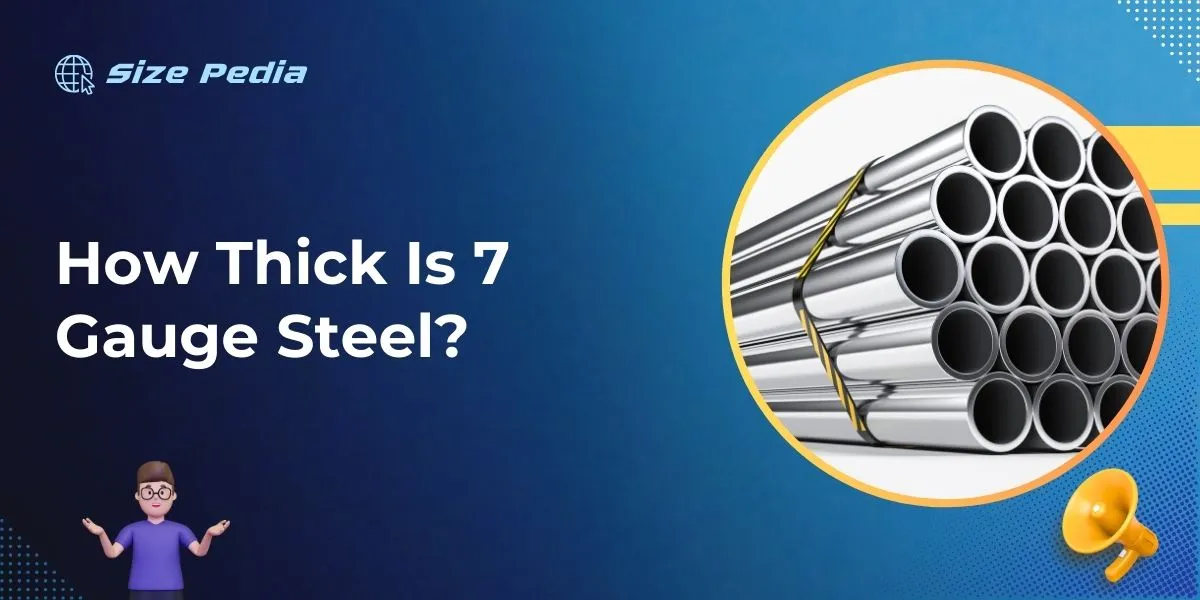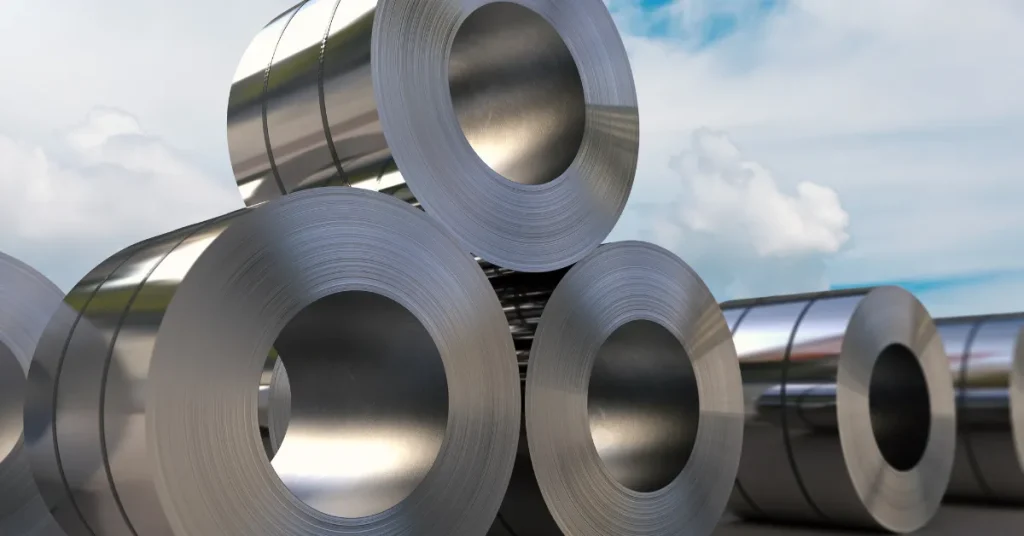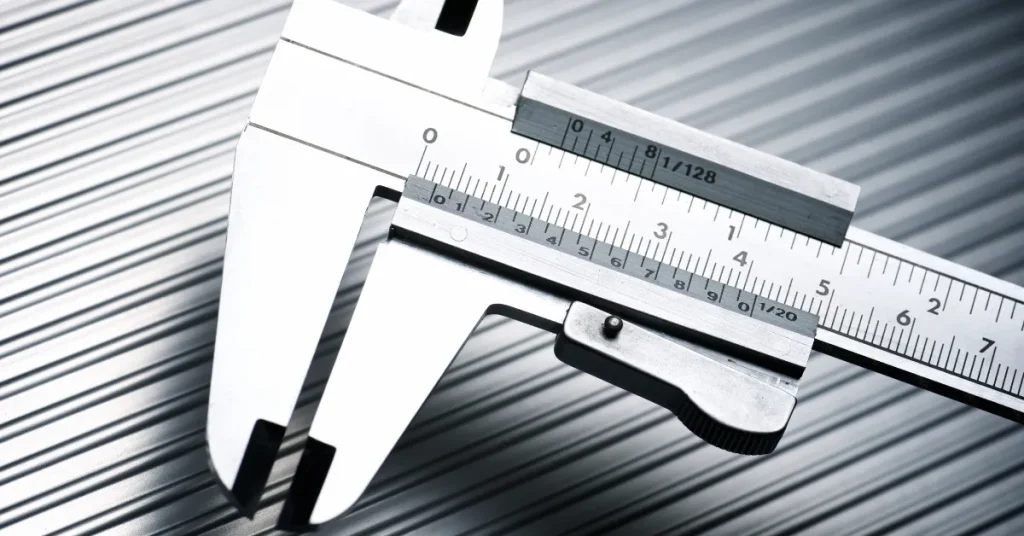7 gauge steel is approximately 0.1793 inches thick. 7 gauge steel has a thickness of 4.554 millimeters.
Understanding the dimensions of materials like steel is crucial for industries ranging from construction to automotive.
7 gauge steel’s durability and thickness make it a common choice for projects where structural integrity and resistance to deformation are important. This particular thickness balances strength and flexibility, making it ideal for a variety of applications.
Quality and specifications must meet high standards, ensuring safety and longevity in the products and structures made from 7 gauge steel.
Selecting the appropriate steel gauge is essential for any project, necessitating a clear insight into the material’s capabilities and characteristics.

Gauging The Thickness
Understanding the thickness of steel is crucial for various projects. The term ‘gauge’ refers to the thickness or size of a piece of metal.
Knowing the specific gauge of steel helps professionals and hobbyists alike choose the right material for their needs. Different gauges imply different thicknesses. Let’s dive into what 7 gauge steel means in the world of metalworking.
Decoding Gauge Numbers
Steel gauge numbers can be puzzling. Many assume that a higher gauge number means a thicker piece of steel. It’s the opposite. The gauge system works in reverse; the lower the number, the thicker the metal.
This comes from the gauge system’s origin when metal sheets were referred to by the number of pieces that could be stacked to the inch.
| Gauge | Thickness (Steel) |
| 7 Gauge | Thicker than 8, 9, 10… |
| 10 Gauge | Thinner than 7, 8, 9… |
Seven Gauge Steel In Inches And Millimeters
The size of 7 gauge steel in inches and millimeters tells us its thickness. It’s important to know this for precision in projects. In the US, steel gauges get measured in accordance with a standard called the American Iron and Steel Institute (AISI) guidelines.
- 7 gauge steel = 0.1793 inches
- In millimeters, that’s 4.5542 mm
This knowledge helps us in project planning. It affects weight, strength, and utility. Always check the gauge thickness before starting your work. Correct thickness ensures safety and quality in metal fabrication.
Strength In Numbers
The measure of steel’s thickness often hides the secrets of its strength. In heavy-duty environments, steel must resist wear, bear loads, and face rough conditions. This is where its thickness plays a pivotal role.
One such robust contender in the thickness arena is 7 gauge steel. Let’s dive into what sets 7 gauge steel apart and why it’s crucial in determining the lifespan and resilience of steel products.
Comparing 7 Gauge Steel To Other Materials
Understanding steel’s gauge is vital in comparing it with other materials. Here’s a quick look at 7 gauge steel in contrast with common materials:
- Aluminum: Lighter, but less sturdy than 7 gauge steel.
- Plastic: Not as durable or capable of supporting heavy weights.
- Wood: Susceptible to weather, unlike steel which can weather the storm better.
| Material | Thickness | Strength |
| 7 Gauge Steel | 0.1793 inches | High |
| Aluminum | Varies | Medium to Low |
| Plastic | Varies | Low |
| Wood | Varies | Medium |
Impact Of Thickness On Durability
Thickness equates to a longer lifespan when it comes to steel. Thicker gauges, such as the 7 gauge, can withstand more force and abuse.
- Resistant to dents and punctures.
- Capable of bearing heavy loads without bending.
- Less likely to crack under pressure.
This means structures or products made from 7 gauge steel are built to last. From industrial machinery to outdoor structures, the extra thickness provides an assurance of enduring through tough conditions.
Choosing the right thickness is key to the longevity and reliability of steel products.
Manufacturing Techniques

Understanding the manufacturing of 7 gauge steel is key to its applications. This steel is 0.1793 inches thick. It’s used in various industries. Strength and durability stand out in 7 gauge steel. Processes transform this steel into useful shapes. Let’s dive into how this happens.
Processes That Shape 7 Gauge Steel
Diverse methods turn steel into products. Here are some:
- Rolling: Adjusts the steel to a specific thickness.
- Forming: Bends steel into shapes.
- Stamping: Cuts out parts with a die.
- Welding: Joins steel with heat.
These help in creating strong, reliable 7 gauge steel items.
Consistency In Steel Thickness
Maintaining uniform thickness is crucial. Quality control is vital. Consistency ensures products meet specs. Here’s how:
- Using precise tools for measurement.
- Applying rigorous testing to every batch.
- Adhering to industry standards for flatness.
Such care means 7 gauge steel will perform as expected.
Practical Applications
The strength of steel is key in many projects. How thick is 7 gauge steel? It’s about 0.1793 inches. This makes it a top choice for tough jobs. Industries love it for its durability. It serves well where tough material is a must.
Industries Relying On 7 Gauge Steel
Certain sectors can’t do without 7 gauge steel. It’s a building block for them.
- Construction: For sturdy frameworks.
- Automotive: In parts that protect.
- Manufacturing: Machines need tough components.
- Shipbuilding: For vessels that last.
- Defense: In equipment that shields.
Products Built From 7 Gauge Steel
Many products rely on 7 gauge steel’s strength. Below is a list of such items.
| Product | Application |
| Storage Tanks | For holding liquids and gases. |
| Trailers | To haul heavy loads. |
| Metal Buildings | Creates strong structures. |
| Heavy Machinery | Parts that deal with stress. |
Measurement Considerations

Understanding the thickness of 7 gauge steel involves precise measurement. The term “gauge” refers to the steel’s thickness. In this context, a lower gauge number means thicker steel.
For 7 gauge steel, the thickness is 0.1793 inches. This measurement is critical in industries where specific metal thickness is required for safety and performance.
Tools For Assessing Steel Gauge
Determining the gauge of steel requires specific tools:
- Micrometers offer highly accurate thickness measurements.
- Calipers provide an easy way to measure without damaging the material.
- Ultrasonic thickness gauges use sound waves for non-destructive testing.
Challenges In Measuring Metal Thickness
Several factors can complicate thickness measurements:
| Challenge | Impact |
| Surface Finish | Texture can affect tool accuracy. |
| Material Composition | Alloys might require special consideration. |
| Tool Calibration | Tools must be calibrated for precise readings. |
| Temperature Changes | Metal expands or contracts with temperature. |
Professionals must address these factors to obtain accurate measurements. The right tools and awareness of potential challenges ensure precise assessments of 7 gauge steel thickness.
FAQs About How Thick Is 7 Gauge Steel
What Is 7 Gauge Steel In Inches?
7 gauge steel is 0. 1793 inches thick. This measurement is standard and used for various steel products and applications.
What Is Thicker 7 Gauge Or 10 Gauge?
A 7 gauge item is thicker than a 10 gauge one. Gauge numbers decrease as material thickness increases, so lower numbers signify greater thickness.
What Gauge Is 1 16 Of An Inch?
A 1/16 of an inch corresponds to approximately 16 gauge in sheet metal thickness or 0. 0625 inches in decimal form.
What Is Stronger 7 Gauge Or 11 Gauge Steel?
7 gauge steel is stronger than 11 gauge steel. The lower the gauge number, the thicker and stronger the steel.
Conclusion
Wrapping up, understanding 7 gauge steel’s thickness—roughly 0. 1793 inches—is crucial for various projects. Its durable profile suits industrial applications perfectly.
Keep this guide handy to choose the right gauge for your next endeavor with confidence and precision.
Resources:
1. https://www.libertysafe.com/blogs/the-vault/what-does-steel-gauge-mean
